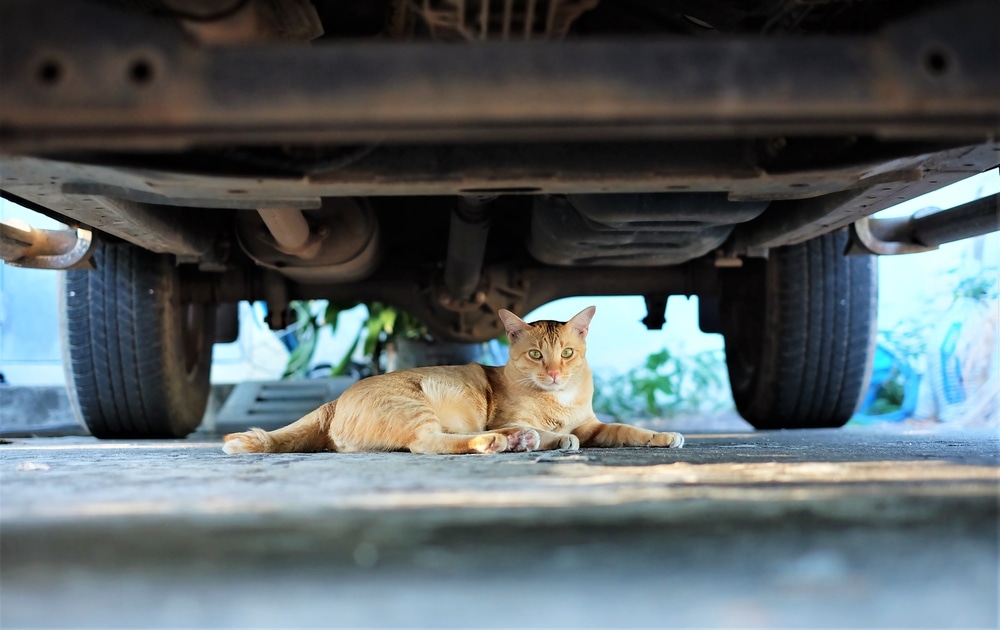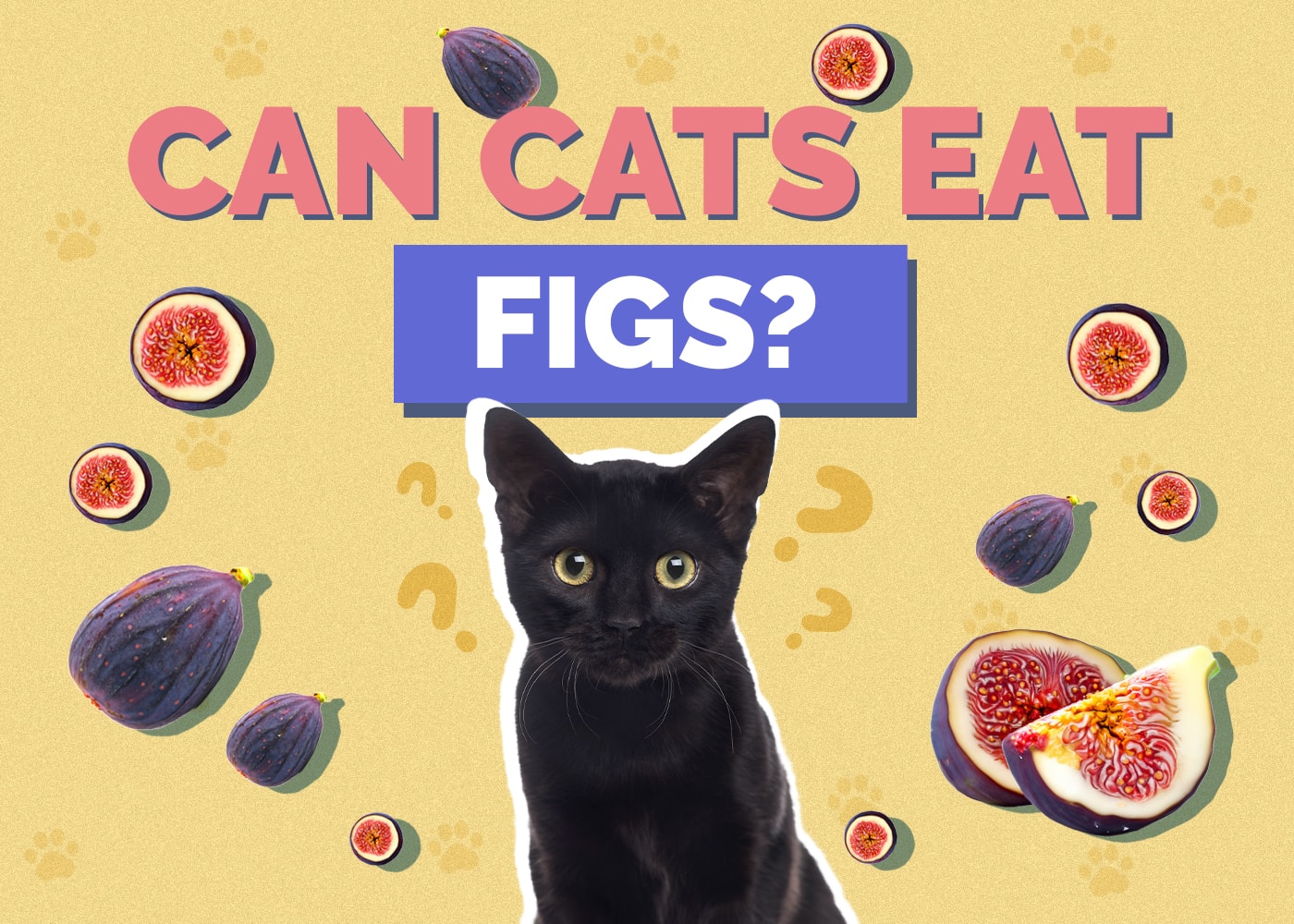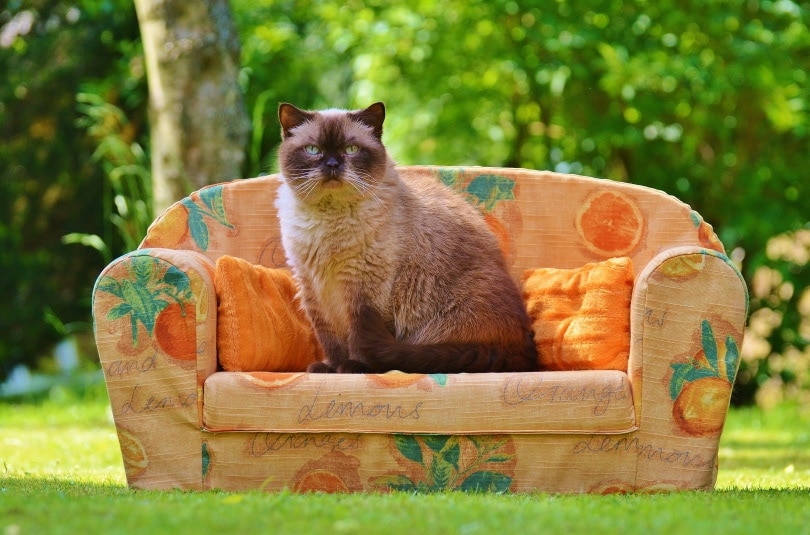12 Possible Reasons Why Your Cat is Breathing So Hard & Vet Approved Advice

Updated on
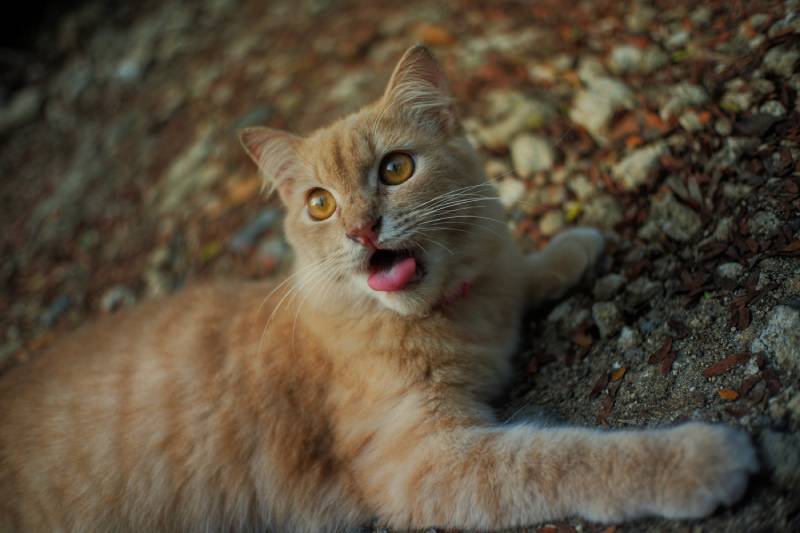
Cats are usually aloof in nature and aren’t like dogs in the way that they give clear signals when they are not feeling well. As a pet owner, it’s essential to determine when something is slightly off with your cat. It can be the most subtle sign that reveals that your cat may not be well, and an instance where your cat may be breathing hard is an example of one of these signs. Cats aren’t known for panting like dogs, and if your cat is breathing hard, it could be a situational response, or it could mean there is an underlying health issue. Here are some common reasons why your cat could be breathing so hard.
The 12 Possible Reasons Why Your Cat is Breathing So Hard
1. Asthma
Asthma may seem like a condition that only affects humans, but our cats can develop it too. If your cat is battling asthma, difficult and heavy breathing can be a symptom of the disease, along with coughing and wheezing. Another common tell-tale sign is when your cat hunches over the same way it would cough up a hairball. Asthma can cause the airway to constrict, which makes breathing more difficult. While your cat is sleeping or resting, it will generally take between 24–30 breaths per minute, but if you notice your cat taking over 40, you should get your kitty to the vet.
Treatment for Feline Asthma
Asthma in cats is usually progressive and cannot be cured, which means that an asthmatic cat is likely to experience flare-ups that can be mild or severe. However, asthma can be managed and allow your cat to live comfortably with the condition. You can help by installing a purifier, monitoring their breathing, and administering medication when necessary.
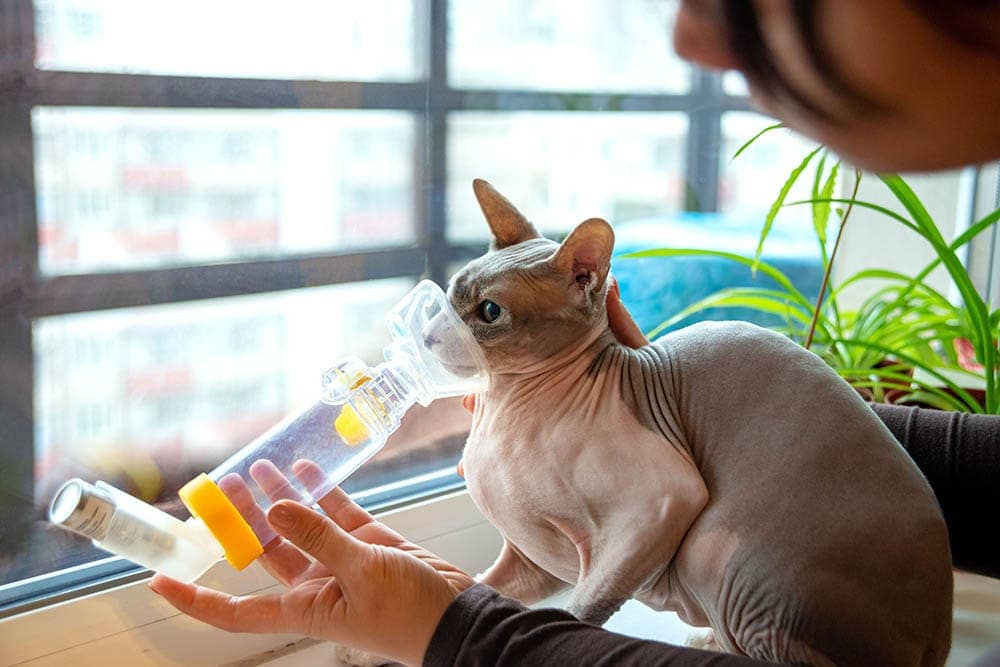
2. Exertion and Heat
When a cat plays for long periods, the heat exertion may cause it to breathe more rapidly. Rapid breathing with an open mouth enables saliva to evaporate from the tongue, which helps the cat cool down, an action also known as panting. It’s not as common in cats as it is in dogs, but if your cat is breathing hard after play or exercise, its breathing rate should drop to normal once it has rested. If your cat is panting and you notice other symptoms, such as a fast heart rate, sunken eyes, and reduced urination, your cat may be dehydrated.
Treatment and Prevention
Ensure your cat gets enough water and rest after a lot of physical activity. Keep fans and the air conditioner blowing to keep the environment cool. If your cat is severely dehydrated, you must get to the vet to ensure it is properly treated. Your vet may need to run a drip to administer fluids.
3. Foreign Objects
Cats can accidentally inhale or consume objects that become lodged in their airways, which reduces airflow and can result in heavy breathing. For example, during playtime, your cat may accidentally ingest a toy or a piece of yarn or string. This foreign object can become lodged in the esophagus and constrict tracheal airflow. On rare occasions, these objects might also find their way to the trachea. Depending on the location and size of the blockage, it may become fatal. If you suspect that a foreign object might be causing breathing difficulties in your cat, take it to the vet immediately.
4. Toxins
Poisons that inhibit blood clotting can cause internal bleeding and result in hard breathing, and cats can be poisoned in various ways. They can ingest toxins from poisoned prey, groom fur exposed to toxins, or consume toxic substances. Toxins can include household cleaners, plants, and medications.
Treatment for Toxins
You should immediately contact your veterinarian if you suspect your cat has come into contact with a human over-the-counter medication or toxic substance. Time is valuable and the treatment approach will depend on the toxin.
5. Respiratory Infections
An upper respiratory infection can make breathing difficult for your cat. These infections usually start as viral and progress into bacterial infections. The most common viruses to cause upper respiratory infections are Feline Herpesvirus type 1, and the most common bacteria are Bordetella bronchiseptica and Chlamydophila felis.
Along with labored breathing, your cat may experience sneezing, conjunctivitis, discharge from the eyes or nose, and nasal congestion. If the infection is not severe, it will typically last 7–10 days and will be contagious to other cats during that time.
Treatment for Respiratory Infections in Cats
Depending on the underlying cause your veterinarian may prescribe medical treatment. Minor infections may be treated symptomatically at home, but more severe cases can lead to hospitalization. If your cat is battling with a congested airway, a humid environment, such as a few short sessions in a steamy bathroom, may help provide relief.
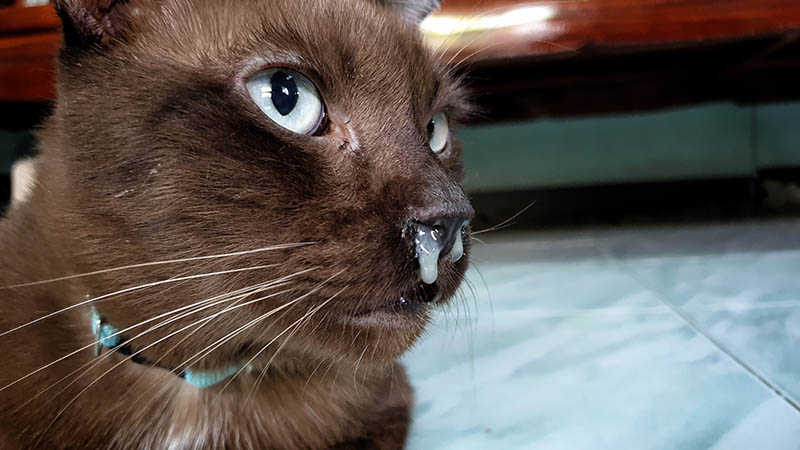
6. Heartworms
Although heartworms are not as common in cats as dogs, they can still get heartworms after being bitten by an infected mosquito. Heartworms can cause difficulty with breathing, along with vomiting, weight loss, and reduced appetite. The most obvious sign of heartworm in cats is respiratory distress. Heartworms cause inflammation and reduced blood flow that will damage the lungs.
Treatment for Heartworm in Cats
Treatment will include corticosteroids to reduce inflammation, an antiparasitic, and in more serious cases, oxygen therapy is required. Preventative medications are important to reduce the risk of heartworms since they can be fatal.
7. Trauma
Even if there are no obvious external lesions, trauma can cause non-visible damage. Internal injuries, whether in the chest or other parts of the body, can result in heavy breathing due to pain, the displacement of organs, neurological damage, etc. A veterinarian should be able to determine if your cat’s heavy bleeding is due to trauma. They will examine your cat, collect biological samples or diagnostic images as needed, and formulate the best treatment plan to help your cat recover.
Treatment for Trauma
A veterinarian should be able to determine if your cat’s heavy bleeding is due to trauma. Th vet will examine your cat, collect biological samples or diagnostic images as needed and formulate the best treatment plan to help your kitten recover.

8. Anemia
Anemia is a condition where there are too few red blood cells. Red blood cells carry oxygen, and when there isn’t enough, the anemia can lead to rapid breathing. There are numerous causes of anemia in cats, but they can be divided into three major causes: red blood cell loss, destruction, and the inability to produce new red blood cells. Infestations of fleas and ticks are a significant cause of anemia, particularly in kittens, because the parasites suck blood from the body faster than it can be replaced.
Treatment for Anemia in Cats
Treatment will differ based on the underlying causes. Treatment for parasites or infectious diseases may be necessary in some cases to prevent the loss or destruction of red blood cells. A blood transfusion may be required in cases of serious anemia to replace red blood cells that have been lost or destroyed while the underlying condition is being treated.
9. Tumors
If a cat’s tumor is big enough, it can affect the natural movements of the lungs and heart, which may cause it to breathe harder. If your cat’s breathing is labored, along with coughing and noisy and high-pitched breathing, it may be a sign of a laryngeal tumor or tracheal tumor.
Treatment for tumors
If your cat is presenting signs of having a tumor, you need to make an appointment with your vet. If the diagnosis is positive for a tumor, your cat may require chemotherapy, radiation, or surgery.
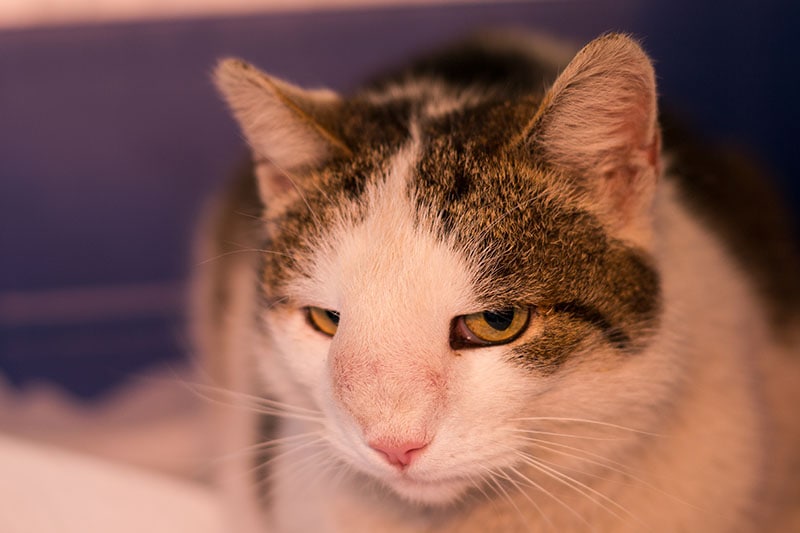
10. Heart Disease
Cats, like humans, can develop heart disease, and one of these conditions is congestive heart failure. Congestive heart failure can decrease the heart’s ability to move oxygenated blood through the cat’s body, resulting in abnormal breathing. As the fluid builds up in the chest cavity, the lungs become unable to inflate properly. The lungs may also become clogged with fluid, affecting their ability to function normally.
Treatment for Heart Disease
Unfortunately, the damage that is caused to the heart is usually irreversible. You may be able to correct the fluid buildup with proper treatment and start your cat on the necessary medication to reduce the development of the condition.
11. Pulmonary Edema
Pulmonary Edema in cats is when the lungs fill with fluid. When this happens, the lungs are unable to oxygenate the cat’s blood effectively, which results in rapid breathing to compensate. Head trauma can usually cause pulmonary edema in cats, but it is most often associated with pneumonia.
Treatment
Treatment will depend on how serious the condition is. Oxygen may be used to help the cat breathe, and diuretics may be administered. Your cat should rest to encourage faster recovery.
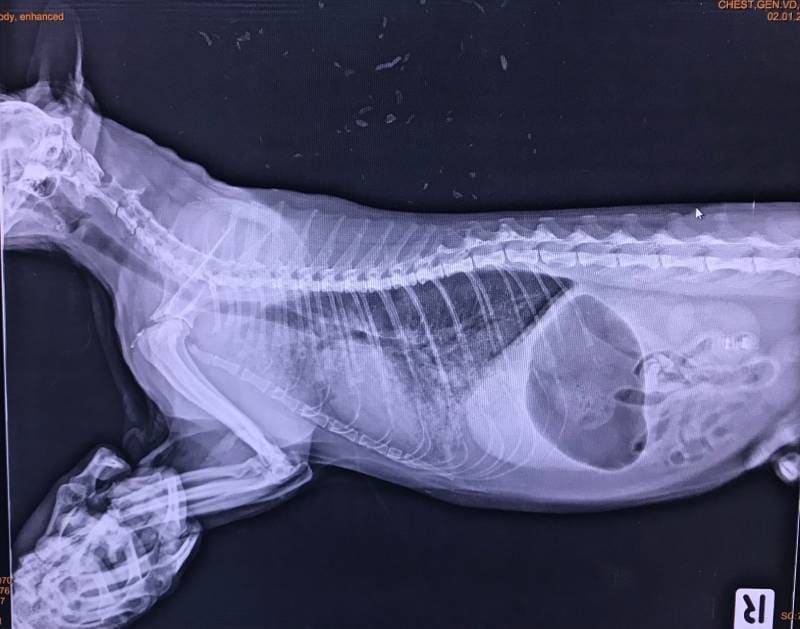
12. Pleural Effusion
Pleural Effusion is the abnormal buildup of fluid in the chest cavity. The presence of fluid in the chest cavity limits the ability of the heart and lungs to function normally, resulting in an increased respiratory rate and other signs of respiratory distress. This happens in cats because either too little fluid is absorbed or too much fluid is produced in the pleural cavity. The accumulation of fluid may be caused by the blood’s protein content or changes in pressure among other causes.
Treatment
The fluid in the chest cavity will need to be drawn out with a needle. Treatment that follows will be determined by the cause, but treatment can include surgery and pleuroperitoneal shunts.
What to Do If Your Cat Has Trouble Breathing
Cats may end up panting if they have had some strenuous exercise, and if that is the case for your cat, the heavy breathing should subside when your cat has had an opportunity to rest and cool down.
If you notice your cat breathing heavily, consider where it was, the temperature, and what it was doing before the panting started.
If your cat hasn’t taken part in anything strenuous and is not overly hot, the hard breathing will be due to something that needs medical attention. Unless you know that your cat is exhausted or has had a stressful experience, you should never overlook hard breathing.
If your cat’s breathing returns to normal, you know it is a situational response, but if your cat’s breathing doesn’t slow down after exercise and rest, you should contact your vet immediately.
Conclusion
You should never ignore heavy breathing in cats. Cats don’t usually pant like dogs, but they can breathe harder if they are exhausted from exercise, are suffering from the heat, or have encountered a frightening situation. This rapid breathing will usually subside as your cat rests and rehydrates, but if the hard breathing continues, it could mean there is a more serious health issue that may need attention.
Take note of other signs, such as abnormalities in the eyes, the color of the gums, and your cat’s behavior. If you notice anything odd and your cat is breathing unusually, it is always best to get it to the vet as soon as possible. Breathing complications can quickly become fatal. In any case, a proper diagnosis and necessary treatment should be provided sooner rather than later.
Featured Image Credit: Luqman Fajri, Shutterstock


